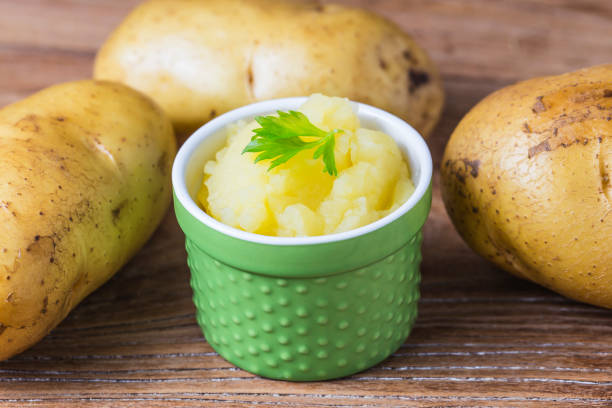
Can you eat a raw potato
Cooked potatoes are trendy in salads, side dishes, and main dishes.
However, eating potatoes in raw form isn’t as prevalent since they’re usually thought to be less appealing and more difficult to digest.
While eating potatoes in raw form could provide various health benefits, there are some questions regarding their nutritional and safety.
This article focuses on the benefits and dangers of raw potatoes and the decision of whether they’re beneficial or harmful.
Raw Potatoes vs. Cooked Potatoes
Raw potatoes usually possess a bitter flavor, and the texture is starchy, which isn’t appealing to many.
Many people favor baking, frying, or grilling their potatoes before eating them.
This results in various distinctions in taste, texture, and color.
When cooked potatoes are raw and cooked, there is a procedure known as the Maillard reaction. When heated, it is a chemical reaction between amino acids and reduced sugar ( 1Trusted Source).
The effect of browning is responsible for the distinctive flavor and color, as well as the crispness of the cooked potato.
Furthermore, research has shown that cooking potatoes produce certain compounds responsible for the distinctive flavor that makes cooked potatoes more delicious than raw ones ( 2Trusted Source).
Raw potatoes possess a bitter taste and a starchy texture. When cooked in the oven, potatoes are subjected to the Maillard reaction, creating compounds that enhance their flavor.
Resistant Starch Content
Raw potatoes are a great source of starch known as resistant, which the body can’t absorb or digest. Instead, it’s used to supply the energy needed by the beneficial bacteria in your gut ( 3Trusted Source).
The addition of resistant starch to your diet is associated with a myriad of health benefits.
Studies have shown that it could decrease blood sugar levels, increase insulin sensitivity, and leave you fuller to aid in losing weight ( 4Trusted Source, 5Trusted Source, 6Trusted Source).
Resistant starch can also be converted into butyrate. It is an essential short-chain fat acid that can help improve digestive health.
Studies in test tubes have shown that butyrate can reduce colon inflammation and inhibit the growth of colon cancer cells. ( 7Trusted Source, 8Trusted Source).
According to one review, butyrate treatment can also reduce symptoms of IBS, also known as irritable bowel syndrome (IBS), such as stomach pain and bloating ( 9Trusted Source).
Higher in Vitamin C
Cooking potatoes can make them more delicious. However, it could result in a loss of some nutrients too.
Grams for grams and fresh potatoes are lower in calories and carbs. However, they also have less protein than baked potatoes. Additionally, they provide a little less potassium and Vitamin B6 ( 10, 11).
However, they’re much higher in other essential micronutrients and contain twice the amount of Vitamin C in a gram than baking potatoes ( 10, 11).
Vitamin C is a vital liquid vitamin that functions as an antioxidant. It also can play a part in everything that involves collagen, from collagen production to immunity ( 12Trusted Source).
Because high temperatures can destroy vitamin C, eating your potatoes raw rather than cooked is a great way to boost the amount of this essential vitamin.
Antinutrients May Inhibit Nutrient Absorption
Potatoes are a source of antinutrients, such as trypsin inhibitor protein and lectins that can hinder the body’s digestion and nutrition absorption ( 13Trusted Source, 14Trusted Source).
The cooking of potatoes has been proven to reduce the content of antinutrients to optimize the absorption of nutrients and avoid deficiency.
For example, a test-tube study found that cooking potatoes could inactivate one kind of trypsin inhibitor completely and partially deactivate an additional ( 15Trusted Source).
A second study on test tubes found that cooking potatoes remove 50 to 60 percent of the amount of lectin ( 14Trusted Source).
If you eat a balanced and diverse diet, antinutrients are unlikely to cause problems.
If you’re on an incredibly restrictive diet and have your diet on cereals, legumes, or tubers, cooking potatoes could be a solution to increase nutrient absorption.
May Contain Toxic Compounds
They contain glycoalkaloids. This is an organic compound found in nightshade members that are toxic when consumed in large quantities.
Potatoes, especially those green, are made up of two kinds of glycoalkaloids: solanine and Chaconine.
If potatoes are exposed to sunlight, they create chlorophyll. It is a phytochemical that makes potatoes change color to green.
In addition, sun exposure can also trigger levels of glycoalkaloids, which is why it’s advised to avoid eating green potatoes to reduce the intake of these toxic chemical compounds ( 16Trusted Source).
If taken in large doses, signs of glycoalkaloid-related toxicity could include drowsiness, itching, increased sensitivity, and digestive issues (17 Trusted Source).
According to a study in a test tube, boiling, baking, and microwaving potatoes may significantly reduce the concentration of glycoalkaloids ( 18Trusted Source).
Avoid peeling your potatoes that have become green, and ensuring you have the proper storage to prevent exposure to sunlight will also lower the chances of developing adverse consequences ( 19Trusted Source).
The Bottom Line
Raw potatoes tend to trigger digestive issues. They also may contain more harmful and antinutrient substances.
They’re also rich in vitamin C and resistant starch, which can provide significant health benefits.
In reality, both cooked and cooked potatoes are delicious in moderation as a part of a balanced diet. Make sure you practice food safety practices and follow the correct cooking techniques.
No matter how you decide to cook your potatoes, make sure that you wash them well and store them properly. Take advantage of various other fruits and veggies to complement your diet.